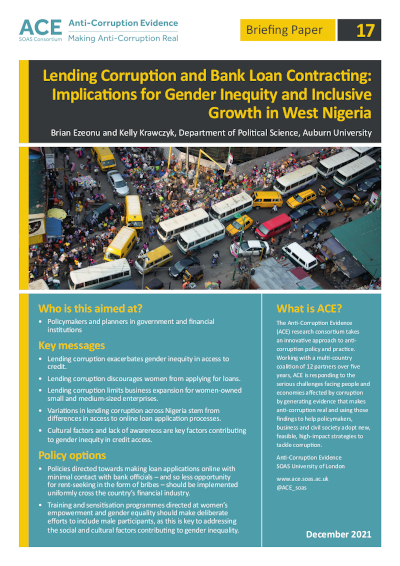
Publication Type: Briefing Paper
Countries: Nigeria
Authors: Brian Ezeonu, Kelly Krawczyk
Publication date: April 2022
Keywords: Finance
The Nigerian banking industry lacks comprehensive strategies for effectively addressing lending corruption
and loan contracting in the sector. Study authors have argued that weak governance and supervision in the banking industry have left the banking sector vulnerable to corrupt practices like bribery, nepotism, fraud, conflicts of interest and political corruption. Lending corruption, which is the focus of this brief, captures both paying bribes and using familiarity rather than merit as the metric for access to credit. In Nigeria, women face numerous challenges in accessing credit. The leading causes of gender-based
inequality in this access are lack of information, lack of landed assets and other sociocultural factors. Lending corruption in the banking sector is also another factor contributing to this gender inequity.
This policy brief is based on a research study involving field data collection from 120 small and medium-sized enterprises, 60 bank officials and key informants in the banking sector. Across three states in Nigeria, it investigated the perception of lending corruption, its incidence and its impact on women-owned SMEs. The study’s key findings include evidence of variation in the perception and incidence of corruption across the different states as a result of different banking policies, and that lending corruption discourages women-owned SMEs from seeking loans through banks, resulting in a lack of capital to expand their businesses over time. We recommend policies to mitigate this market restriction-driven corruption that align with the Anti-Corruption Evidence (ACE) research consortium strategies of aligning incentives and designing for differences, in the form of online loan application approaches that reduce the opportunities for rent-seeking by bank officials, through the use of centralised and structured credit systems, and via the inclusion of men as well as women in empowerment and sensitisation programmes.

